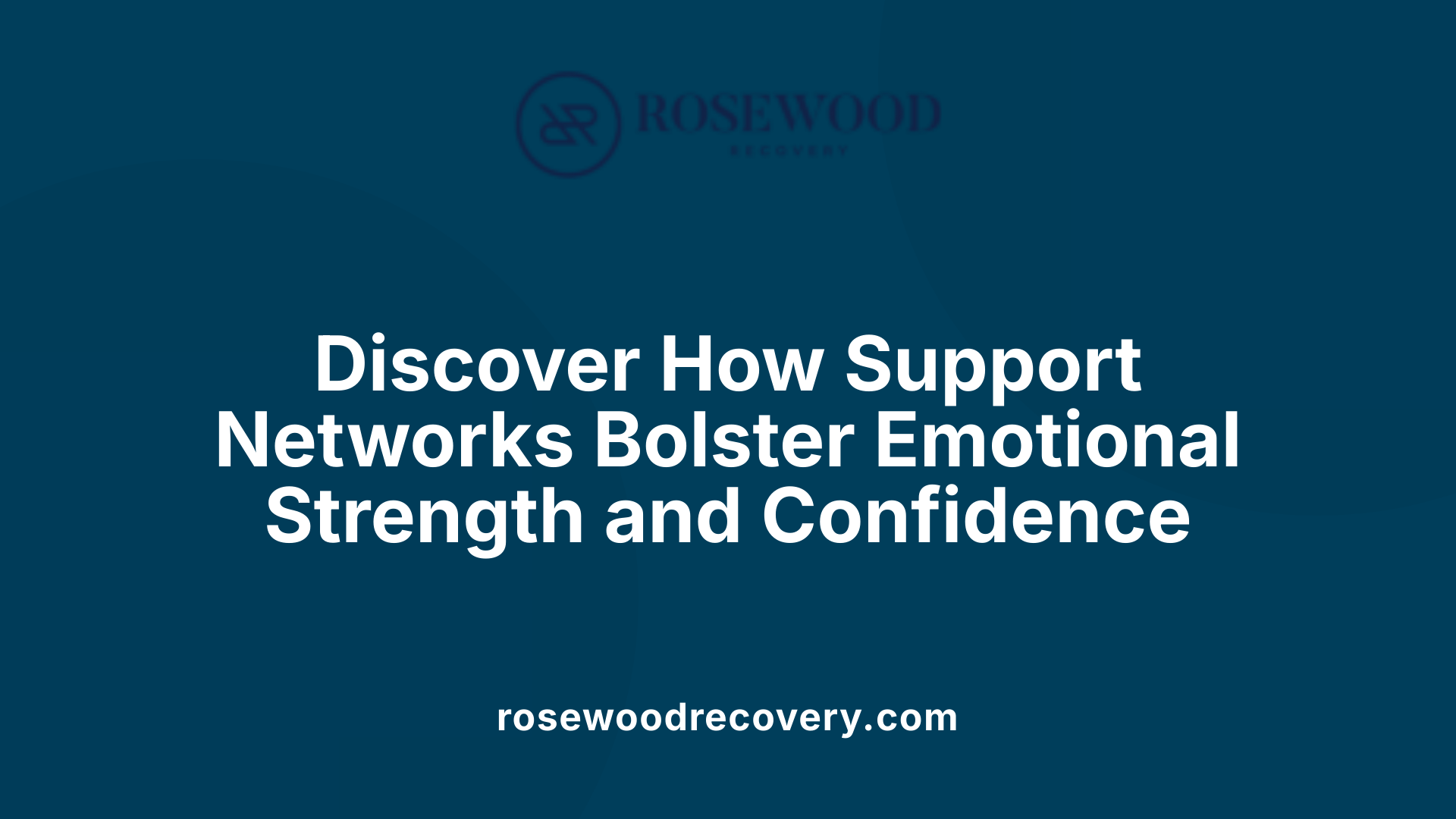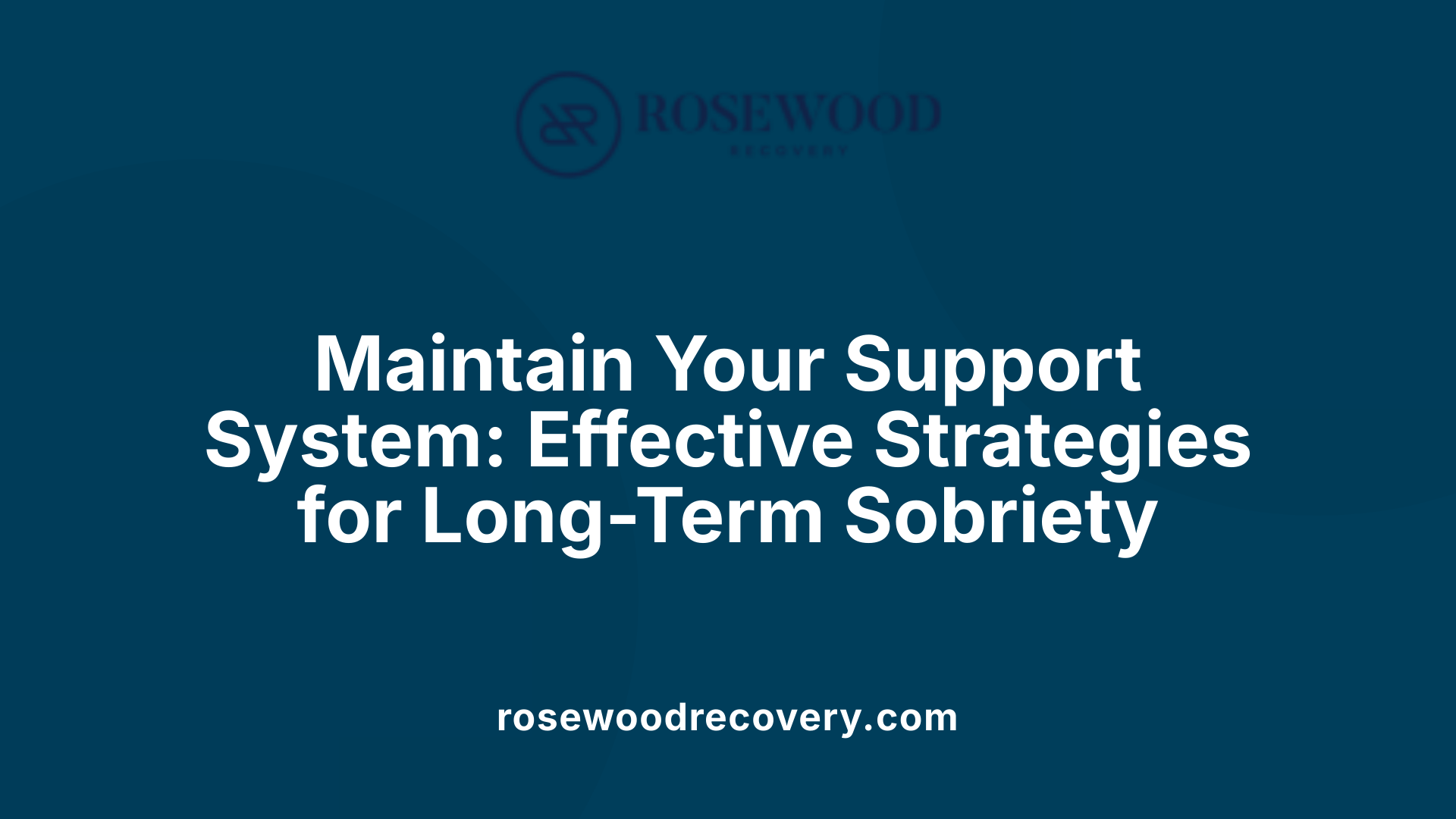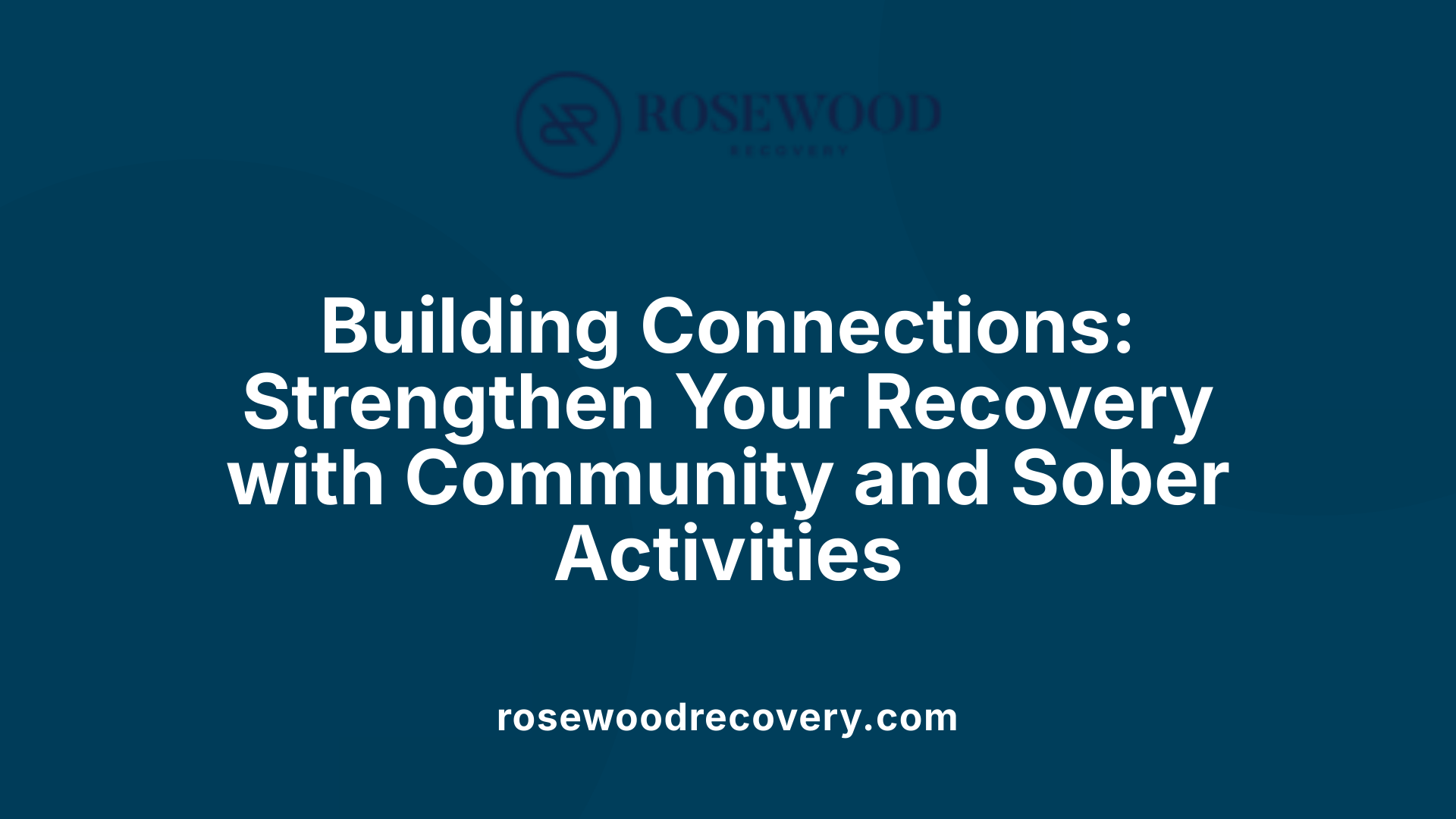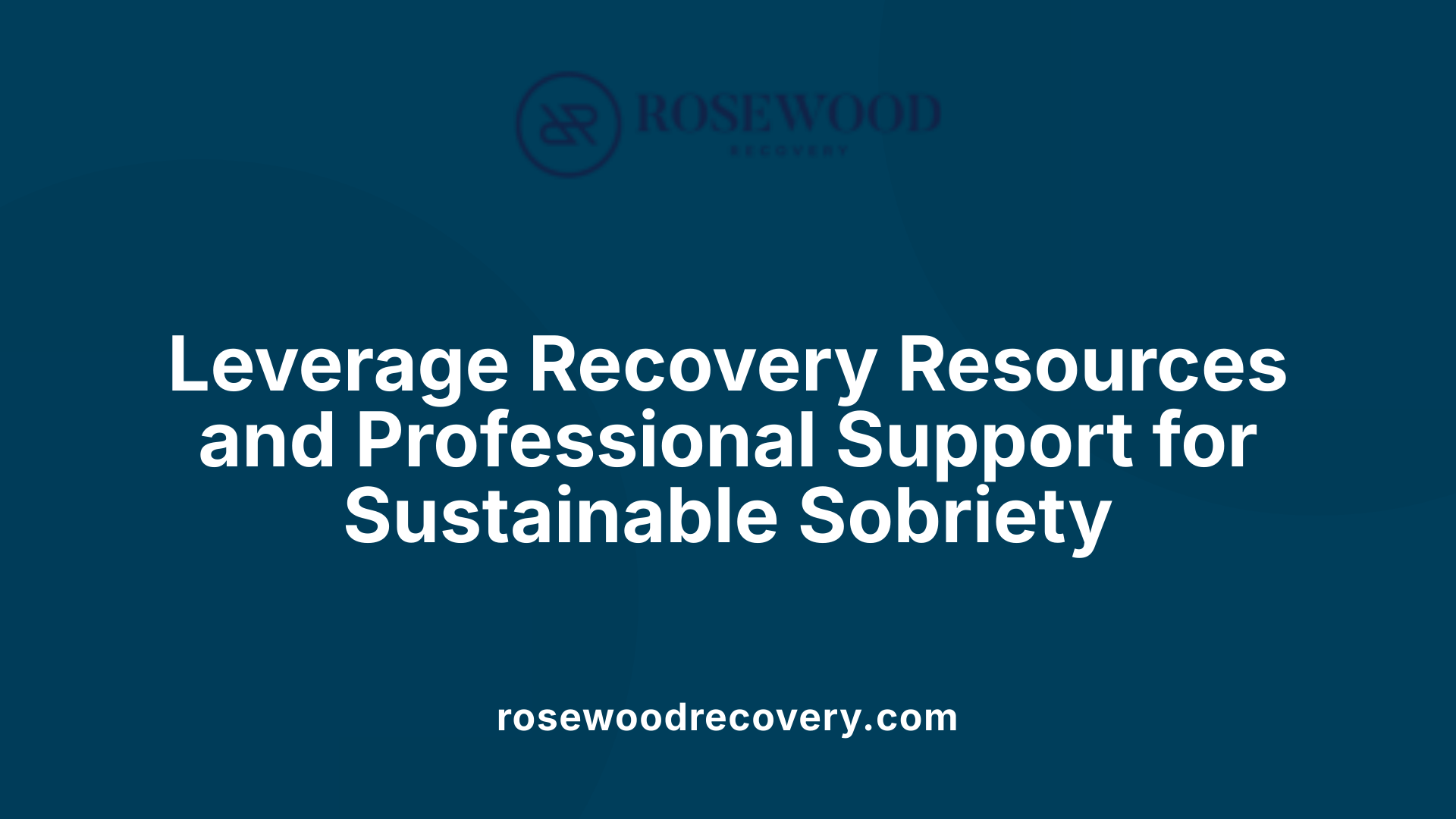Understanding the Foundation of Lasting Sobriety
Recovery from addiction is a multifaceted journey that requires more than just individual determination. One of the most crucial elements in sustaining sobriety is the development of a robust sober support network. This network serves as a safety net, offering emotional, social, and practical support, and significantly increases the chances of achieving long-term recovery. In this article, we explore the various components of support networks, their benefits, and effective strategies to build and maintain thriving sober communities.
The Components and Roles of a Sober Support Network
What are support groups like AA, NA, or NAMI?
Support groups such as Alcoholics Anonymous (AA), Narcotics Anonymous (NA), and the National Alliance on Mental Illness (NAMI) play a vital role in recovery by providing a safe environment for sharing experiences and mutual encouragement. These groups foster community among individuals facing similar struggles, reducing feelings of isolation and stigma related to addiction. Regular meetings offer a platform to connect with peers, hear success stories, and learn coping strategies—crucial elements that promote sustained sobriety.
Participation in these groups also enhances social support, which has been linked to better recovery outcomes. They often operate on a peer-led basis, with members providing mentorship, guidance, and emotional backing. Moreover, groups like AA and NA help reinforce accountability by encouraging consistent engagement and goal setting. For many in recovery, these groups become a second home, offering community, structure, and hope.
Who are sponsors and sober friends?
Sponsors are experienced individuals within the recovery community who act as mentors, guiding newcomers through their sobriety journey. They provide practical advice, emotional support, and accountability, often serving as a touchstone during challenging times. Having a sponsor helps reinforce commitment and offers a personalized support system tailored to an individual’s specific needs.
Sober friends are peers committed to sobriety, helping to reinforce healthy habits and provide companionship free from substance use. These relationships are essential for maintaining motivation, sharing coping strategies, and navigating social situations that might otherwise trigger relapse. Building relationships with sober friends and sponsors creates a network of support that sustains long-term recovery.
How do therapists and family involvement support recovery?
Therapists and other mental health professionals address underlying issues contributing to addiction, such as trauma, anxiety, or depression. They help clients develop coping mechanisms, recognize triggers, and implement relapse prevention strategies. Regular therapy sessions provide emotional support and facilitate personal growth, which complements community-based support.
Family involvement is also crucial, as a supportive family environment enhances stability and emotional well-being. Resources like Al-Anon and Nar-Anon offer support specifically for family members of individuals with substance use disorders, enabling family members to better understand recovery processes and provide effective support.
What role do recovery centers and alumni programs play?
Recovery centers, including outpatient and inpatient treatment facilities, are foundational in establishing initial sobriety. They often facilitate access to support networks through group therapies, aftercare programs, and alumni groups.
Alumni programs connect former clients, fostering ongoing relationships that sustain recovery over time. These programs provide continued encouragement, peer support, and opportunities to participate in sober activities, reinforcing the social bonds necessary for lasting sobriety.
| Component | Description | Additional Details |
|---|---|---|
| Support Groups | AA, NA, NAMI | Offer regular meetings, shared experiences, and community support |
| Sponsors and Friends | Mentors and sober peers | Provide guidance, accountability, and companionship |
| Therapists and Family | Mental health professionals and family support | Address underlying issues and strengthen emotional foundation |
| Recovery Centers & Alumni | Treatment facilities and ongoing support programs | Support initial recovery and foster lifelong sober communities |
Building a strong sober support network involves actively seeking out these components. Attending meetings, connecting with sponsors and sober friends, engaging with therapists and family members, and participating in alumni activities all contribute to a resilient recovery foundation.
Supporting long-term sobriety benefits from a diverse mix of relationships and resources. A well-rounded network not only provides emotional encouragement but also practical assistance and accountability, all crucial for overcoming challenges during recovery.
Recovery is an ongoing journey, and a supportive community fosters resilience, hope, and lasting change. Integrating these elements creates a durable support system that can adapt to the evolving needs of an individual in recovery, ultimately increasing the chances of a successful, substance-free life.
The Psychological and Emotional Benefits of Support Networks

Why is a support group important in recovery?
Support groups are a vital component of addiction recovery because they offer more than just a space for sharing experiences. They create a sense of community and provide social support, which are crucial for emotional stability. When individuals connect with others who understand their struggles, they often feel less isolated and more motivated to maintain sobriety.
Sharing personal stories and hearing success stories from peers help combat feelings of shame and self-doubt. This mutual understanding fosters a sense of acceptance and belonging, which are important for emotional healing. Besides emotional support, support groups serve as educational platforms where members learn coping strategies and relapse prevention techniques, enabling sustained sobriety.
Peer-led groups such as Alcoholics Anonymous (AA), Narcotics Anonymous (NA), or secular options like SMART Recovery emphasize mutual support, accountability, and personal growth. These organizations often become a cornerstone of aftercare, reinforcing long-term abstinence. Attending regular meetings helps individuals stay connected, motivated, and committed to their recovery journey, especially during challenging times.
Participation in such groups also boosts self-esteem and confidence. As individuals share their progress and receive positive reinforcement, they develop stronger self-belief and resilience. Over time, this collective support nurtures emotional strength, making it easier to face everyday life without substance use.
How does a support network increase self-esteem and confidence?
A sober support network plays a significant role in enhancing an individual’s self-esteem and confidence. When people are surrounded by understanding and encouraging peers, they start to see their worth and capabilities more clearly. These positive interactions help counteract the negative self-perceptions often associated with addiction.
Being part of a community that celebrates sobriety milestones and offers validation reinforces a person’s sense of achievement. It also provides tangible proof that recovery is possible—even in the face of setbacks. As members engage in mutual encouragement, their confidence in maintaining sobriety grows.
Additionally, support networks help individuals develop new skills and routines, such as attending meetings, volunteering, or participating in sober activities. Mastering these new roles and habits further reinforces their self-efficacy. This heightened confidence can translate into a greater sense of control over their lives, fostering overall mental well-being.
Emotional healing through connection
Forming strong, supportive relationships is essential in healing emotional wounds caused by addiction. Through ongoing interactions within the network, individuals confront underlying issues like trauma, anxiety, or depression that may have contributed to their substance use.
Support networks facilitate open communication, allowing members to express feelings freely and seek advice. Sharing struggles and victories helps process emotions healthily and build resilience. Stories of others who have successfully navigated their recovery can serve as powerful motivators, instilling hope and reinforcing the belief that change is possible.
Connections within the network also provide stability during stressful times, reducing feelings of loneliness and isolation—common relapse triggers. Emotional support from family, friends, sponsors, therapists, and fellow recovering individuals creates a safety net, making the path to sobriety less daunting.
The broader impact on mental health and well-being
A well-established sober support network contributes positively to overall mental health. It encourages healthier lifestyle choices, introduces wellness activities, and helps establish routines that promote balance and stability.
Supportive social bonds are associated with increased happiness and reduced feelings of anxiety and loneliness. These relationships serve as emotional anchors, helping individuals rebuild their self-esteem and sense of self-worth.
In summary, engaging in sober support networks fosters emotional healing by providing acceptance, encouragement, and practical tools. This environment of understanding and mutual aid not only supports sobriety but also nurtures psychological resilience, self-confidence, and overall well-being—foundations for a sustainable recovery.
Strategies to Maintain and Strengthen Your Support System

How can I build a sober support network?
Building a supportive community is a vital step in recovery. Start by joining well-known support groups like Alcoholics Anonymous (AA), Narcotics Anonymous (NA), or SMART Recovery, where you can connect with others who share your journey. These groups offer not only camaraderie but also practical advice and motivation.
In addition to attending meetings, involve trusted family members and friends who support your sobriety. Consider finding a sponsor—an experienced person in recovery who can provide mentorship, guidance, and accountability. The support from a sponsor can be instrumental during challenging times.
Expanding your support options through online communities and digital recovery services can be particularly helpful, especially when in-person meetings are not feasible. These platforms offer a flexible way to stay connected, share experiences, and seek advice.
Creating a diverse support network enhances resilience. It should include professional support from therapists or counselors addressing underlying issues, peer groups for shared understanding, and loved ones who encourage your progress.
Effective communication is the foundation of a strong support system. Be open about your needs, set clear boundaries, and express your appreciation for those supporting your recovery. Building trust takes time, so remain patient and consistent.
Engaging in sober activities and community events, like group hikes, art classes, or sports leagues, can strengthen bonds and create new, substance-free social connections. These activities provide joy, purpose, and an environment conducive to long-term sobriety.
Remember, a successful support network is dynamic. Continually nurture and evaluate your relationships, celebrate milestones, and stay committed to healthy interactions. By doing so, you create a stable environment that supports ongoing recovery and overall well-being.
Incorporating these strategies ensures your support system remains robust, trusted, and capable of guiding you through the ebbs and flows of recovery.
Regular meetings and communication
Consistent participation in support groups and maintaining open dialogue with your support network are essential. Regular meetings help reinforce your commitment and provide ongoing encouragement. Clear, honest communication fosters mutual understanding and accountability, helping to surface and address challenges early.
Healthy boundaries and mutual respect
Establishing boundaries protects your emotional space and ensures relationships remain supportive rather than enabling or toxic. Respect within your network creates a safe environment where everyone’s efforts are valued, and misunderstandings are minimized.
Celebrating milestones and achievements
Recognizing your progress—whether it's days, weeks, or months sober—boosts morale and confidence. Celebrating these milestones with your support community reinforces your commitment and demonstrates the positive impact of social connections.
Engaging in sober activities and community events
Participation in community activities such as sober social events, sports, volunteer work, or hobby groups creates substance-free environments that foster connection and purpose. These activities help rebuild trust, reinforce healthy routines, and expand your social connections.
| Strategy | Details | Purpose |
|---|---|---|
| Regular meetings & communication | Attend scheduled support group meetings; stay in touch with your network | Reinforces commitment; provides ongoing encouragement |
| Healthy boundaries & respect | Set limits on relation dynamics; promote mutual understanding | Protects emotional well-being; fosters respect |
| Celebrating milestones | Mark achievements with your support network in ways meaningful to you | Builds confidence; validates recovery efforts |
| Sober activities & events | Participate in activities that are substance-free and community-based | Strengthens bonds; promotes a healthy lifestyle |
Building and maintaining a strong sober support system is an ongoing process. It requires effort, openness, and patience. But the rewards—long-term sobriety, emotional resilience, and a renewed sense of community—are invaluable in your recovery journey.
Building community and fostering mutual support

How does participating in community events and sober social activities help in recovery?
Engaging in community events and sober social activities plays a significant role in strengthening a person's support network. These activities, which can include things like sober outings, sports leagues, book clubs, art classes, or group trips, create substance-free environments where individuals can enjoy social interactions without the influence or pressure of substances.
Participating in such events helps rebuild relationships and establish new connections with like-minded people. It provides a sense of belonging and purpose, reminding individuals that they are part of a supportive community that shares their goal of sobriety. Sober social activities also promote healthier routines, assist in developing new hobbies, and boost self-esteem by celebrating participation and milestones.
These experiences further reinforce the importance of sober living and demonstrate that life post-addiction can be fulfilling and joyful. As individuals become more involved, they often find themselves more motivated to maintain their sobriety, leveraging the shared experiences and encouragement from their community.
Why is volunteering in recovery causes beneficial?
Volunteering within recovery causes offers multiple advantages for those in sobriety. It provides an opportunity to give back to the community, which can enhance feelings of purpose and self-worth. Helping others who are still struggling with addiction fosters empathy and a sense of solidarity, reminding individuals of how far they've come.
Volunteer work within recovery circles, such as supporting peer groups, organizing sober events, or participating in community outreach, also helps build meaningful relationships and expand social support networks. Through these acts of service, individuals gain practical skills, boost self-confidence, and reinforce their commitment to sobriety.
Moreover, volunteering can serve as a coping mechanism during challenging times, providing constructive distraction and engagement. The act of helping others often triggers positive emotions and reinforces a sober identity—key components for long-term recovery.
How do engaging in sober living communities support long-term sobriety?
Sober living communities, such as homes like Oxford Houses or other structured environments, serve as vital support hubs for individuals adjusting to sobriety post-treatment. These communities foster a safe, substance-free environment where residents live together with shared goals and ongoing support.
In sober living settings, residents participate in routine activities like house meetings, chores, and social events, which help establish a stable daily rhythm. These environments encourage accountability, ongoing commitment, and the development of healthy habits.
Living among peers who understand recovery challenges provides emotional support and motivation. It also offers practical help—such as assistance with job searching, attending appointments, or navigating social situations—providing a comprehensive platform for reintegration into the community.
By maintaining close-knit, supportive relationships and engaging in communal activities, residents strengthen their resolve and resilience. Such environments significantly increase the likelihood of long-term sobriety and help prevent relapse by creating a strong, connected community.
How does a diverse support network contribute to sustained recovery?
Having a diverse support network broadens the safety net for someone in recovery. It includes family members, friends, support groups like AA or NA, sponsors, therapists, and sober friends. Each component offers unique resources—emotional guidance, practical help, accountability, and shared understanding.
This variety ensures that individuals are supported from multiple angles and situations. For example, professional counselors can address underlying mental health issues, while sober friends can provide companionship during social events.
Building a diverse network also distributes the emotional and practical demands placed on any single relationship, reducing strain and increasing stability. Regular communication, boundaries, and mutual support create a resilient support structure.
Effective management of this network—including sharing progress, celebrating milestones, and seeking help when needed—supports sustainable recovery. It fosters resilience by offering multiple points of encouragement and resources, making it easier to face setbacks and challenges.
How do support networks promote emotional well-being and reduce relapse risk?
Support networks are crucial for maintaining emotional well-being during recovery. They offer validation, encouragement, and a safe space for individuals to express fears, struggles, and victories.
Having strong social bonds decreases feelings of loneliness and isolation, which are common relapse triggers. Shared experiences and connections foster a sense of belonging, boosting confidence and self-esteem.
Regular check-ins and accountability help identify early signs of relapse or dangerous behaviors, enabling timely intervention. These ongoing supports create a safety buffer against stress and cravings.
Participating in supportive relationships also helps in developing healthier lifestyle habits by modeling positive behaviors and routines. For example, involvement in sober activities and community events encourages continued engagement and commitment to sobriety.
Research indicates that social support not only improves mental health but also correlates with longer abstinence periods and better treatment adherence, emphasizing its importance in sustained recovery.
What are practical ways to build and maintain a support network?
Building a solid sober support network involves intentional steps:
- Join local or online support groups like Alcoholics Anonymous, Narcotics Anonymous, or SMART Recovery. Regular attendance fosters community and shared motivation.
- Establish relationships with sponsors and sober friends who understand recovery and can offer mentorship.
- Engage in sober activities and community events to expand social circles and establish common interests.
- Participate in sober living environments or alumni programs that reinforce ongoing support.
- Involve family members and loved ones, ensuring open communication, boundaries, and mutual understanding.
- Seek professional help from therapists, counselors, or healthcare providers for underlying issues and coping strategies.
- Utilize online recovery communities and apps for additional accessible and flexible support options.
Maintaining these relationships requires openness, patience, and consistency. Celebrating milestones, showing appreciation, and offering mutual support are foundational to strengthening the support network.
How does building and sustaining support networks influence long-term recovery?
Strong and enduring support networks are fundamental to lasting sobriety. They help individuals navigate the complex emotions, triggers, and social pressures associated with recovery.
Having reliable emotional and practical support boosts confidence, encourages accountability, and provides motivation during challenging times.
These networks also foster a sense of community and belonging, which are critical for emotional healing and resilience.
Continuous engagement—through support groups, sober activities, and community involvement—creates a sustainable environment for recovery. It also reduces the risk of relapse by consistently reinforcing healthy behaviors and offering encouragement.
Building such networks often leads to long-term friendships and relationships that serve as ongoing sources of strength well beyond initial recovery phases. This ongoing support is essential for enduring change, making recovery not just a goal but a sustainable lifestyle.
The Role of Recovery Resources and Professional Support

What are the 4 D's of sobriety?
The four D's of sobriety are delay, distraction, deep breaths, and de-catastrophize. These strategies help individuals manage cravings and emotional distress by postponing the urge to use substances, diverting attention to healthier activities, practicing calming techniques like deep breathing, and reframing negative thoughts to reduce anxiety.
Maintaining sobriety involves more than just resisting cravings; it requires making lifestyle changes and actively engaging in support systems. For example, participating in support groups such as Alcoholics Anonymous (AA) or Narcotics Anonymous (NA) can provide ongoing motivation and understanding.
Celebrating milestones and recognizing personal progress reinforce commitment. Recognizing and navigating triggers, especially during difficult times like holidays or stressful periods, is essential for long-term success.
Overall, sobriety is a lifelong journey that benefits mental, physical, and spiritual well-being. Building healthy routines, fostering community connections, and committing to continuous personal growth are elements that support sustained sobriety and resilience.
What are the benefits of a sober support network?
A sober support network offers a multitude of advantages for those in recovery. It significantly boosts self-esteem by providing a sense of acceptance and belonging.
Having like-minded people who understand the challenges of recovery encourages individuals to stay committed to sobriety. Emotional support, shared experiences, and peer encouragement help reduce feelings of isolation, a common relapse trigger.
Support networks also provide practical resources and guidance. For example, the SAMHSA’s National Helpline offers free, confidential, 24/7 referrals to local treatment centers, support groups, and community organizations. These help individuals find the right treatment plan and ongoing support tailored to their circumstances.
Furthermore, connections within a sober community foster motivation and accountability. Regular check-ins, sharing successes and setbacks, and participating in sober activities enhance confidence and resilience.
Feeling part of a community not only reduces loneliness but also promotes healthier lifestyle choices. Engaging in sober events like community service, sports, or artistic activities makes recovery more fulfilling.
In summary, a well-established support network promotes emotional stability, strengthens commitment, and paves the way for lasting sobriety. It is foundational to overcoming challenges and ensuring long-term success in recovery.
Fostering a Lifelong Commitment to Sobriety
Building and maintaining a comprehensive sober support network is essential for anyone seeking long-term recovery from addiction. It provides the emotional groundwork, social encouragement, and practical resources needed to navigate the complex journey of sobriety. Through active participation in support groups, leveraging professional resources, and engaging with sober communities, individuals can solidify their commitment, rebuild their lives, and find a renewed sense of belonging and purpose. Ultimately, a strong support network is not just a facilitator of recovery but a vital pillar that sustains ongoing growth, resilience, and health—making sobriety not just a goal but a sustainable way of life.
References
- Importance of a Sober Support Network - Pinelands Recovery Center
- Building a Sober Support Network: The Bedrock of Recovery
- The Importance of Building a Supportive Network in Recovery
- The Importance of Building a Sober Support Network | Guiding Road
- The Importance of Social Support in Recovery Populations
- The Importance of a Sober Support Network - Harbor Detox
- The Importance of Support Networks in the Recovery Process
- How to Build a Support Network During Addiction Recovery

.jpeg)


